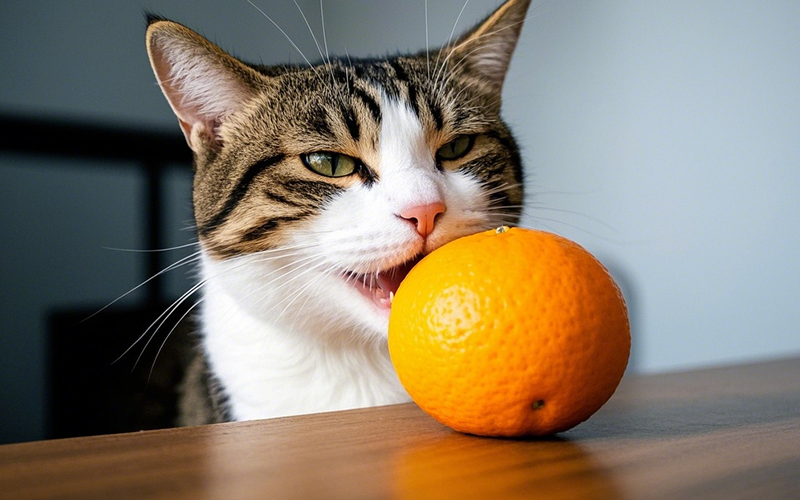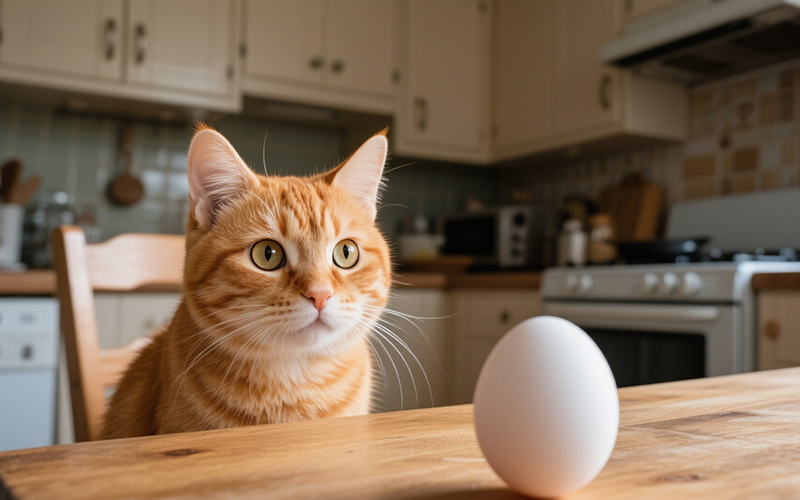Can Cats Eat Oranges? A Guide to the Tangy Fruit and Your Feline Friend
- 29 Mar 2025 11:09
Oranges are a popular citrus fruit known for their juicy sweetness and vitamin C content. But if you're a cat owner, you might wonder, “Can cats eat oranges?” 🍊 While many humans enjoy this refreshing fruit, it’s important to understand that oranges and other citrus fruits are not safe for cats. Let's break down why you should avoid feeding oranges to your feline companion.

Why Oranges Are Not Safe for Cats
Citrus Oils and Acids: Oranges contain citric acid and essential oils, which are toxic to cats in large quantities. The compounds found in citrus fruits, such as limonene and linalool, can cause digestive upset and other health problems in cats. Even a small amount of orange can irritate their stomach, leading to symptoms like vomiting, diarrhea, and excessive drooling. 😾
Digestive Upset: Cats’ digestive systems are not built to process fruits, especially citrus. The acidity in oranges can lead to gastrointestinal issues like vomiting, diarrhea, and discomfort. While some cats might tolerate a tiny bit of orange, it's not worth the risk, as even small amounts can cause digestive disturbances. 🍽️
Toxic Compounds in the Peel and Seeds: In addition to the fruit itself, the peel and seeds of an orange contain compounds that can be harmful to cats. The peel contains higher concentrations of essential oils, which can cause poisoning if ingested in larger amounts. The seeds can also be a choking hazard.
Lack of Nutritional Value for Cats: While oranges are rich in vitamin C, cats don’t need this vitamin in their diet in the same way humans do. Cats produce their own vitamin C, so the nutrients in oranges don’t benefit them. Cats are obligate carnivores, which means their bodies require a diet that is primarily based on meat and animal proteins. 🥩
What Should You Do if Your Cat Eats Orange?
If your cat eats a small amount of orange, it might not cause severe harm, but you should still monitor them closely for any signs of discomfort or illness. Symptoms to watch for include:
Vomiting
Diarrhea
Drooling
Lethargy
Loss of appetite
If your cat consumes a significant amount of orange or shows signs of poisoning, contact a pet health professional immediately. For quick advice, you can also use PettureX, the pet AI software that offers 24-hour online consultation and pet image recognition to help you assess whether your cat has consumed something harmful. 📱
Safer Alternatives for Cats
If you’re looking to give your cat a treat, there are plenty of safe and healthy options that will support their health and well-being:
Cooked Meat: Plain, cooked chicken, turkey, or fish are the best sources of protein for your cat. They’re packed with the nutrients your cat needs.
Catnip: A natural, non-toxic treat that can offer your cat some fun and mental stimulation.
Small Amounts of Vegetables: While not essential, some cats enjoy small portions of cooked vegetables like carrots or peas. These can be a safe way to add variety to their diet.
High-Quality Cat Food: Stick to high-quality commercial cat food that’s specifically designed to meet all of your cat’s nutritional needs.
Conclusion
In conclusion, oranges are not safe for cats and should be avoided. The citric acid, essential oils, and acidity can cause digestive issues, and the peel and seeds can be toxic. While a small amount may not cause immediate harm, it's best to keep oranges away from your cat altogether. If you're ever unsure about what foods are safe for your cat, consider using PettureX for expert guidance. With PettureX, you can ensure your cat's health and safety by getting quick and accurate advice. Keep your feline friend happy and healthy with the right treats and meals! 🐾
Related

Can Cats Eat Egg Yolk Raw? A Vet's In-Depth Guide to Feline Nutrition & Safety
- 10 Jun 2025
Can Cats Eat Dog Kibble? Unpacking the Nutritional Mismatch!
- 29 May 2025
Can Cats Eat Deli Turkey? Slicing Through the Facts for Your Feline!
- 29 May 2025
Can Cats Eat Deer Meat? Exploring Venison for Your Feline!
- 28 May 2025
Can Cats Eat Corned Beef? Unpacking This Salty Human Delicacy!
- 28 May 2025
Can Cats Eat Cooked Rice? The Grain Truth for Your Feline Friend!
- 27 May 2025
Can Cats Eat Cornbread? A Crumb of Truth for Curious Cat Owners!
- 27 May 2025
Can Cats Eat Cooked Meat? Sizzling Facts for Your Feline's Feast!
- 26 May 2025
Can Cats Eat Chili? Spicing Up the Truth About This Human Dish!
- 26 May 2025
Can Cats Eat Chicken Eggs? Cracking the Code on This Feline Food Query!
- 24 May 2025
